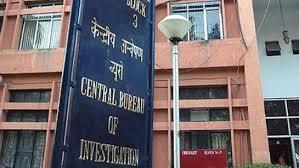Maharashtra – The Central Bureau of Investigation has achieved a significant breakthrough in combating port corruption as CBI Arrests Customs Officer for allegedly orchestrating a systematic bribery scheme worth ₹10.2 lakh. The arrested customs superintendent was caught red-handed while accepting illegal payments from a customs house agent in exchange for facilitating cargo clearance at a Mumbai port.
This high-profile case where CBI Arrests Customs Officer demonstrates the agency’s commitment to rooting out corruption within critical trade infrastructure. The operation represents a significant victory against organized corruption that has been undermining legitimate trade operations and government revenue collection at one of India’s busiest ports.
The successful operation that led to CBI Arrests Customs Officer followed extensive surveillance and evidence gathering, showcasing the agency’s methodical approach to investigating complex corruption networks within government departments.
Systematic Bribery Scheme and Corruption Network

The investigation that culminated in CBI Arrests Customs Officer revealed a sophisticated corruption mechanism where bribes were demanded at ₹10 per kilogram of imported cargo. This systematic approach to extortion indicates organized corruption that went far beyond individual misconduct, involving multiple levels of the customs hierarchy.
According to agency officials involved in the case where CBI Arrests Customs Officer, the superintendent was not acting alone but was collecting bribes both for personal gain and on behalf of senior officers. This revelation suggests a well-established corruption network that required coordinated investigation and enforcement action.


The complaint leading to CBI Arrests Customs Officer detailed how the accused demanded kickbacks to ensure “smooth clearance” of shipments, effectively holding legitimate trade operations hostage to illegal payment demands. This extortion mechanism created additional costs for importers while compromising the integrity of customs operations.
Evidence Gathering and Investigation Process


The meticulous investigation preceding CBI Arrests Customs Officer involved comprehensive verification of complaints received between July 25 and August 1. The agency ensured independent witnesses were present throughout the evidence-gathering process, strengthening the legal foundation for prosecution.
The case where CBI Arrests Customs Officer was built on solid evidence including recorded conversations that corroborated the complainant’s allegations. These recordings provided crucial documentation of the superintendent’s illegal demands and threats, creating an irrefutable case against the accused officer.
Material evidence collected during the investigation that led to CBI Arrests Customs Officer included documentation of specific bribe amounts and the systematic nature of the corruption scheme. This evidence will be crucial for successful prosecution and preventing similar corruption in the future.
Also Read: Odisha Burn Case Update: Girl’s Mortal Remains to Return Home from AIIMS Delhi
Detailed Breakdown of Illegal Demands
The investigation revealing why CBI Arrests Customs Officer uncovered specific details of the bribery scheme, including a demand for ₹6 lakh for previously cleared consignments. Of this amount, ₹5.8 lakh was allegedly intended for the superintendent’s superiors, while ₹20,000 was earmarked for personal gain.
Additional evidence in the case where CBI Arrests Customs Officer showed the accused had sought ₹10 lakh specifically for facilitating the release of a consignment being held at the port. This demand represented a direct obstruction of legitimate trade operations for personal financial gain.
The systematic nature of corruption in the case where CBI Arrests Customs Officer extended to future operations, with the superintendent seeking ongoing bribes at ₹10 per kilogram for all subsequent shipments. This long-term extortion plan demonstrated the entrenched nature of the corruption network.
Retaliation Tactics and Intimidation Methods
The complaint that led to CBI Arrests Customs Officer revealed how the superintendent employed retaliation tactics when bribes were refused. These included deliberately withholding consignments and issuing threats to customs house agents who resisted illegal payment demands.
Such intimidation methods highlighted in the case where CBI Arrests Customs Officer show how corruption becomes systematic when officials abuse their regulatory authority to coerce compliance. The superintendent’s ability to obstruct legitimate trade operations gave him significant leverage over importers and their agents.
The retaliation tactics documented in the investigation where CBI Arrests Customs Officer demonstrate how individual corruption can evolve into organized extortion that undermines entire regulatory systems and legitimate business operations.
Legal Proceedings and Charges Filed
Following the operation where CBI Arrests Customs Officer, the agency registered a comprehensive case against the superintendent and unidentified public servants and private individuals. This broad approach recognizes that the corruption network likely extends beyond the arrested individual.

The formal charges in the case where CBI Arrests Customs Officer will encompass not only bribery but also abuse of official position and obstruction of legitimate trade operations. These charges carry significant penalties and demonstrate the serious nature of customs corruption.
The accused in the case where CBI Arrests Customs Officer is expected to be produced before a special court soon, where the strength of evidence gathered during the investigation will be tested through formal legal proceedings.
Impact on Port Operations and Trade Integrity
The successful operation where CBI Arrests Customs Officer sends a strong message about accountability within critical trade infrastructure. Port operations require absolute integrity to maintain India’s position in global trade networks and ensure efficient cargo movement.
The case where CBI Arrests Customs Officer highlights the broader impact of customs corruption on legitimate businesses, trade costs, and government revenue collection. Such corruption creates unfair advantages for those willing to pay bribes while penalizing honest traders.
This breakthrough where CBI Arrests Customs Officer represents an important step toward restoring integrity in customs operations and ensuring that trade facilitation occurs through legitimate channels rather than corrupt payments.

